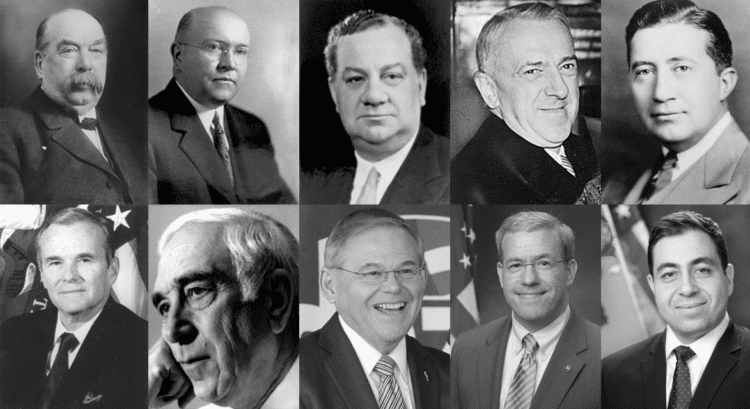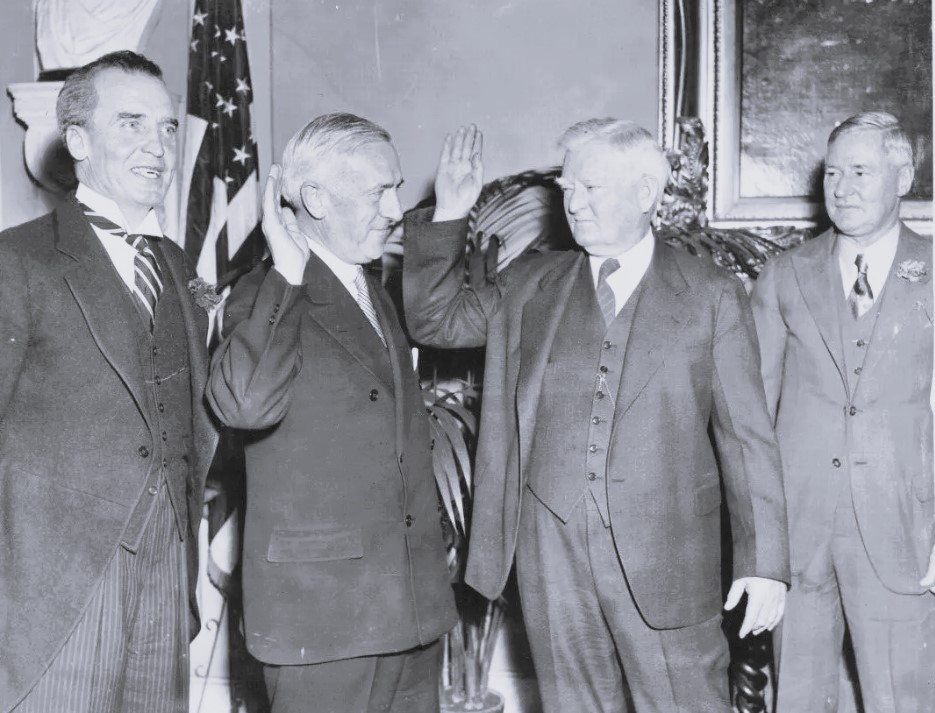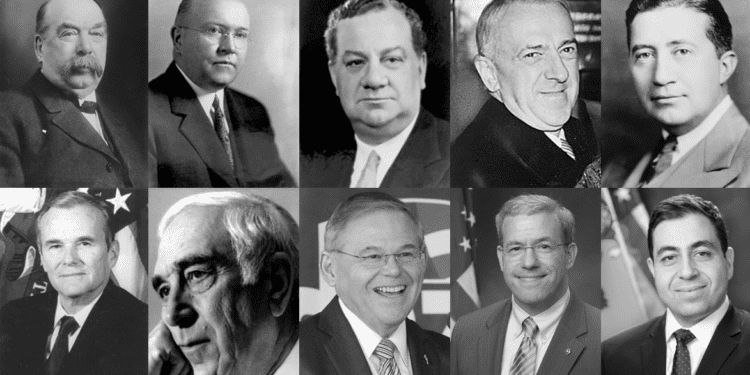 Clockwise from top left: David Baird, Sr., David Baird, Jr., William Barbour, John Milton, Arthur Walsh, Nicholas Brady, Frank Lautenberg, Bob Menendez, Jeff Chiesa and George Helmy.
Clockwise from top left: David Baird, Sr., David Baird, Jr., William Barbour, John Milton, Arthur Walsh, Nicholas Brady, Frank Lautenberg, Bob Menendez, Jeff Chiesa and George Helmy.
George Helmy will become the tenth New Jerseyan appointed to the United States Senate since the ratification of the Seventeenth Amendment established the direct election of senators in 2013. Gov. Phil Murphy, who picked Helmy, becomes the third consecutive New Jersey governor to appoint a U.S. Senator.
Here’s a look at the appointed senators:
DAVID BAIRD, SR.
Republican
February 23, 1918 to March 3, 1919
Appointed in 1918 by Gov. Walter Edge following the death of William Hughes (Democrat) and served for nearly one year. The Ireland-born Baird owned a lumber business and served as a Camden County Freeholder in the 1870s and 1880s and as Camden County Sheriff in the 1880s and 1890s. He ran for U.S. Senate in 1910, when senators were elected by the state legislature, but backed out and supported the incumbent, John Kean. Baird did not seek a full term, and Edge won the Senate seat.
DAVID BAIRD, JR.
Republican
November 30, 1929 to December 2, 1930
After Walter Edge resigned from the Senate to become U.S. Ambassador to France in 1929, Gov. Morgan Larson appointed 48-year-old David Baird, Jr. to replace him; they are the only father-son interim senators. Baird served slightly more than one year before Dwight Morrow, the former U.S. Ambassador to Mexico, won a special election. Baird ran for governor in 1931, but lost to A. Harry Moore, a former governor and political ally of Jersey City Mayor Frank Hague, by a 58%-40% margin. Later, Baird, who ran the family lumber business and sold insurance, served as a Delaware River Joint Toll Bridge Commission commissioner.
WILLIAM WARREN BARBOUR
Republican
December 31, 1931 to January 3, 1937
Dwight Morrow, the father-in-law of aviator Charles Lindbergh, died ten months after becoming a U.S. Senator. Gov. Morgan Larson made his second Senate appointment, choosing William Barbour to replace him. Barbour was the heir to a thread manufacturing business and became the US. Amateur heavyweight boxing champion in 1910; Theodore Roosevelt had urged him to become a professional fighter. Barbour was elected to the Rumson Borough Council in 1922 and was mayor of Rumson from 1923 to 1928. He became the first appointed senator to stand for election; he defeated Rep. Percy Stewart (D-Plainfield) by a 49.6% to 48.5% margin. When he sought a full six-year term in 1936, Barbour lost to State Sen. William Smathers (D-Atlantic City) by a 55%-44% margin; that year, President Franklin D. Roosevelt carried New Jersey by 20 percentage points.
 John Milton is sworn in as a U.S. Senator from New Jersey on January 18, 1938 by Vice President John Nance Garner. U.S. Senator William Smathers, left, and Gov. A. Harry Moore look on. (Photo: David Wildstein Collection).
John Milton is sworn in as a U.S. Senator from New Jersey on January 18, 1938 by Vice President John Nance Garner. U.S. Senator William Smathers, left, and Gov. A. Harry Moore look on. (Photo: David Wildstein Collection).
JOHN G. MILTON
Democrat
January 18, 1938 to November 8, 1938
Back when New Jersey elected governors to three-year terms and prohibited them from seeking re-election, A. Harry Moore was elected governor in 1925, left in 1928, and returned in 1931. Term-limited in 1934, he instead ran for U.S. Senate and ousted Republican incumbent Hamilton Fish Kean, 58%-41%. Moore (and Hague) liked Trenton better than Washington, so he ran for governor again in 1937 and won. He resigned from the Senate to become governor again and appointed John Milton to his seat. Milton was a Hudson County power lawyer, a Port Authority commissioner, a close ally to Jersey City Mayor Frank Hague, and one of Moore’s best friends. In picking Milton, Moore passed over several Democrats interested in the post, including Essex County Democratic Chairman Wiliam Kelly, Assistant Secretary of the Navy Charles Edison, former State Sen. William Ely (D-Rutherford), and James Cromwell, the husband of heiress Doris Duke. Milton did not run in a 1938 special election; that race featured Ely against Barbour, who returned to the Senate after winning by seven points.
ARTHUR WALSH
Democrat
November 26, 1943 to December 7, 1944
Arthur Walsh joined Thomas Edison, Inc., at age 19 as a recording violinist and worked his way up to serving as executive vice president of the West Orange company. In the 1930s, he also served as state director of the Federal Housing Administration and then as the assistant FHA administrator in Washington. Gov. Charles Edison named him to the Port Authority. When William Barbor died in office in 1943 (six weeks before Edison was due to leave office and be replaced by a Republican governor), Walsh was appointed to the U.S. Senate one day later. He did not seek election in 1944 and was replaced by Republican State Chairman H. Alexander Smith.
NICHOLAS F. BRADY
Republican
April 12, 1982 to December 27, 1982
In office less than two months, Gov. Thomas Kean had a chance to appoint a U.S. Senator in March 1982 to replace four-term Democrat Harrison Williams.
Williams, a Democrat, was indicted for his role in the Abscam scandal in 1980 and found guilty of bribery on May 1, 1981, but maintained his innocence and refused to resign from the Senate.
Republicans had ended a 24-year Democratic majority in 1980, and Williams’ seat was up in 1982. In the background was the closest gubernatorial race in New Jersey history; after a recount that went to the end of November, Republican Tom Kean edged out Democrat Jim Florio by just 1,797 votes, 49.46% to 49.38%.
To avoid Kean’s appointment of a Republican U.S. Senator, Democrats in New Jersey and Washington began to intensify their pressure on Williams to resign so that the outgoing governor, Democrat Brendan Byrne, could make the appointment. But Williams, whose sentencing had been pushed to February 1982, refused to go.
Democrats sharpened their push in the days before Kean’s January 19, 1982 inauguration, which continued into inauguration day.
Byrne went to Kean’s inaugural with a letter in his suit pocket addressed to Secretary of State Donald Lan appointing former Senate President Joseph Merlino to the United States Senate. Lan was ordered to remain at Byrne’s side, without fail, until the moment Kean took office, just in case Williams changed his mind at the last minute and tendered his resignation.
In March, ten months after Williams’ conviction, the United States Senate moved to debate whether the gentleman from New Jersey would become just the third U.S. Senator in history – and the first since the Civil War – to be expelled. Expulsion has been the recommendation of the Senate Ethics Committee and required a two-thirds vote.
Still, the 62-year-old Williams refused to go. On March 10, at the end of the fifth day of the Senate expulsion trial, the junior senator from New Jersey, Bill Bradley, announced that he would vote to expel Williams. With a vote near and without the support to avoid being expelled, Williams resigned the following day.
That gave Kean, who had been in office for less than two months, the chance to appoint a Republican to the U.S. Senate.
This wasn’t an easy decision for the fledgling governor: Rep. Millicent Fenwick (R-Bernardsville) and conservative Jeff Bell, a former Reagan speechwriter who had beaten a four-term incumbent in the 1978 GOP Senate primary, were already in the race. A third candidate, Rep. Jim Courter (R-Allamuchy), was also mulling a U.S. Senate bid and had scheduled his announcement in a few days; he decided not to run.
Kean’s top strategist, Roger Stone, brought Bell and Courter to the Kean campaign as co-chairs, bringing a conservative seal of approval for the moderate Kean in the Republican gubernatorial primary. Stone’s move to install Bell as the titular leader of Kean’s campaign played a significant role in Kean securing the nomination.
Fenwick, the colorful, pipe-smoking inspiration for a Doonesbury character, had remained neutral in the gubernatorial primary; she and Kean were old friends, even though they ran against each other for an open House seat in a 1974 primary (Fenwick won by 83 votes). She had considerable support among national and state Republicans.
The U.S. Senate seat was left vacant for over a month as Kean continued mulling his options. He invited over 100 Republican officeholders and community leaders to offer their recommendations, giving out a private code on the outside of an envelope to assure that only the governor would open those letters.
In the meantime, Fenwick and Bell competed at county GOP conventions for organization endorsements.
Rather than give one of the candidates the advantage of incumbency in the primary and general elections, Kean decided to go with a caretaker. He picked Nicholas Brady, a Wall Street banker and old friend who had headed his gubernatorial transition to be nomination interim U.S. Senator and served as a Republican state committeeman from Somerset County.
Fenwick defeated Bell in the primary by a 54%-46% margin. Still, she lost the general election in an upset to Democrat Frank Lautenberg, a first-time candidate who self-funded his campaign, by a little more than three percentage points. Brady resigned early, and Kean appointed Lautenberg to give him a jump on seniority; Lautenberg was sworn into the Senate in Colorado, where he was on a family vacation.
Kean was the only governor in New Jersey history to appoint someone to replace a U.S. Senator who had defeated his father; Williams beat ten-term Rep. Robert W. Kean (R-Livingston) in 1958.
Brady went on to serve as U.S. Secretary of the Treasury under Presidents Ronald Reagan and George H.W. Bush.
FRANK R. LAUTENBERG
Democrat
December 27, 1982 to January 3, 2001
Democrat Frank Lautenberg was elected to the U.S. Senate in November 1982, but Republican Nicholas Brady, appointed in March after Harrison Williams resigned, stepped down early so Lautenberg could get a jump on seniority. Republican Gov. Tom Kean appointed Lautenberg on December 27, 1982. A federal judge swore Lautenberg in at a ski lodge in Colorado; two senators, John Glenn, and Rudy Boschwitz, happened to be vacationing in Vail, so both watched him take the oath.
(The Senate has since changed its rules to prohibit the practice of senators taking office a little earlier to gain an edge in seniority.)
Kean remains the only New Jersey governor to appoint a U.S. Senator of a different party and one of two to make two appointments to the Senate.
Lautenberg went on to win Senate races in 1988 and 1994, and after a two-year retirement that left him miserable – and even mulling a bid for mayor of Paterson – he returned to the Senate in 2002 and remained there until his death on June 3, 2013.
ROBERT MENENDEZ
Democrat
January 17, 2006 to August 20, 2024
Five years after Jon Corzine spent $75 million of his own money to win a U.S. Senate seat, he traded it for what he believed would be an upgrade: Governor of New Jersey. After he won, he appointed Rep. Bob Menendez (D-Union City) to replace him.
Menendez, the number three person in the House Democratic leadership and a former mayor, state legislator, and Hudson County Democratic chairman, wasn’t necessarily the first choice; Reps. Frank Pallone, Jr. (D-Long Branch) and Rush Holt (R-Hopewell), were also under strong consideration. Menendez muscled Corzine, at least a little, by making it clear that he was running for the Senate regardless of who was appointed and threatening to drive a wedge between the new governor and the state’s Hispanic population. Menendez had another cudgel: the sitting Assembly Speaker, Albio Sires, wanted to replace him in the House, which might have been more difficult to deal with if he had been unhappy with Corzine.
Corzine tapped Menendez, who quickly assembled the backing of county chairs and beat an unknown, James D. Kelly, with 84% in the Democratic primary, despite general election polls that showed the race to be a tossup, Menendez, in a Democratic year nationally, defeated State Sen. Tom Kean, Jr. (R-Westfield) by nine points. In all, Menendez won three Senate races and was convicted just once out of two federal corruption trials.
JEFFREY S. CHIESA
Republican
June 6, 2013 to October 30, 2013
After Frank Lautenberg died in office, Gov. Chris Christie briefly mulled several options before appointing one of his best friends, Jeff Chiesa, as a caretaker. The hugely respected Chiesa had been Christie’s law partner before following him to the U.S. Attorney’s office and Trenton; he served as chief counsel and then attorney general. In naming Chiesa, who was uninterested in running for office, Christie decided he didn’t want to put someone in the post who might use their incumbency (and a then-popular governor’s coattails) to flip a Senate seat.
Christie was not pleased about the possibility of a campaign for an open U.S. Senate seat competing for oxygen with his own re-election bid. He already had one running mate, Lieutenant Gov. Kim Guadagno, and the idea of a second one horrified him.
By the time of Lautenberg’s death in June 2013, Christie already had a big lead in the governor’s race; some Republicans felt holding the special election for Senate concurrent with the general election would give them a shot at scoring their first U.S. Senate win since 1972.
One idea floated by underlings was to appoint conservative magazine publisher and former presidential candidate Steve Forbes to the U.S. Senate, with the idea that Forbes would self-fund his campaign. Christie specifically discussed Rep. Rodney Frelinghuysen (R-Harding) at his meeting. (In 2017, when Bob Menendez was on trial for the first time, Christie had a prospective plan to appoint pharmaceutical executive Bob Hugin, who was then prepared to spend his own fortune to keep the seat.)
But the idea of the popular Democratic frontrunner, popular Newark Mayor Cory Booker, being on the same ballot scared the bejabbers out of Christie. To prevent that, Christie opted for an expensive October 16 special election, where Booker beat former Bogota Mayor Steve Lonegan by almost eleven points.
Source link : http://www.bing.com/news/apiclick.aspx?ref=FexRss&aid=&tid=66bd5d2db10b4b22ab5c9854e2b62a60&url=https%3A%2F%2Fnewjerseyglobe.com%2Fcongress%2Fmeet-new-jerseys-10-appointed-u-s-senators%2F&c=11840202170155391891&mkt=en-us
Author :
Publish date : 2024-08-14 13:00:00
Copyright for syndicated content belongs to the linked Source.






